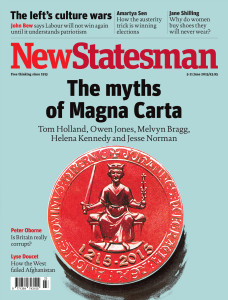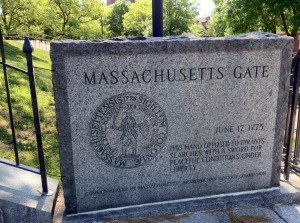When June 14, 2015 rolls around, what’s the best possible outcome of the day? A season finale where Sansa Stark kills Ramsey Bolton? Arya becoming a Faceless Girl? Dany and Tyrion launching their army and dragons toward Westeros?
Nah. Fans of stories set (loosely) in medieval England should spend this June 14th with everyone else celebrating the 800th anniversary of Magna Carta.
The Magna Carta, originally signed (to be precise, affixed with the royal seal) on June 15, 1215, was the treaty that promised protection from illegal imprisonment, unexpected taxes, delays in justice, and protection for a few other matters its signatories called “God-given rights” that today we call “rights.” It was possible partly because in the Middle Ages, power in England wasn’t unicameral, but instead contested between Crown, Church, and landowning barons. Considering the scope, breadth, and audacity of the document’s sentiments, it still seems odd that it was created by men in chainmail and hairshirts, dressed and armed somewhat like Ned Stark and Tywin Lannister (or Mel Gibson in Braveheart, if that’s your thing).
The Magna Carta’s admirers have no intention of letting one of its centenaries pass with the embarrassed squelch that greeted, say, the 1992 quincentenary of Columbus’ so-called Discovery of America. (By the way, any anthropologist will tell you that the cultural bridging of the world’s two hemispheres was one of the five or six most important events in human history; the problem was unnecessary hagiography of a notorious slaver and murderer.) The New Statesman’s new issue is dedicated to the octocentenary, with five excellent essays. David Brooks has weighed in, and Daniel Hannan’s piece in the Wall Street Journal seems to have struck a chord with a certain part of the blogosphere.
Want the TL;DR version of all these encomiums? First the document’s defenders have to admit that it was kind of a Big Lebowski: not exactly a big hit when it came out, but one that found more resonance in the years since. Second, what a fascinating history, particularly as the Magna Carta was re-purposed during the English Civil War and the American Revolution, amongst other times. (Note photo of 1775 seal with tri-corner-hatted patriot bearing a sword in one hand and the Magna Carta in the other.) Third, the Charter has come to mean that “the law” is something inherent in nature and personhood, not a gift granted by royalty or anyone else. As Hannan puts it: “From [it] flowed, ultimately, all the rights and freedoms that we now take for granted: uncensored newspapers, security of property, equality before the law, habeus corpus, regular elections, sanctity of contract, jury trials.”
However, there’s a little too much ideological re-purposing in these celebratory essays, a little too much backward rationalizing – that is, some people have shoehorned the Magna Carta to adhere to a certain kind of Thatcher-Reagan kind of philosophy. (Hannan is a powerful Tory, and unfortunately these people are preening their peacock feathers a bit too much in the days since their resounding victory in May’s election.) You can tell when the Anglo-American chauvinism comes up – as though no other cultures have millennium-old traditions of natural rights and/or division of powers. Some of its celebrants don’t exactly linger on the point that the landed gentry were the only ones benefitting from the treaty in the 13th century – leaving the impression that said celebrants are disproportionately concerned with the landed gentry of the 21st century. Also, the Magna Carta is called the “Great Charter” less because of its themes and more because of its length (it’s long), so it’s a little dischordant to hear conservatives who regularly fell apart at the bloat of the Affordable Care Act now fall all over themselves praising something named after its size.
Still, in some ways I’m no better than the conservative punditocracy. I can also re-purpose the Magna Carta to fit my pre-existing worldview. The difference is that I’m the only one (that I know of) consistently waving this non-partisan populist (read: trust the majority except when it comes to rights), and someone has to salute populism’s debt to the Magna Carta. But we’re already halfway through the blog post, so let’s knock this one out in the final three paragraphs.
I consider populism the “true north” that, with fits and starts, civilized society inevitably heads toward. John Stuart Mill thought much the same thing about what he called utilitarianism (defined as the most good for the most people, which is more or less the same thing). Mill took several chapters to explain his philosophy’s debt to the Magna Carta; I’ll just give you the Cliffs Notes version by saying yes, the Magna Carta made populism possible, because it implied equal protection under the law (eventually) and the consent of the governed (also eventually). As importantly, the Magna Carta signifies a mechanism that implies and promulgates division of powers, various outlets for redress of grievances, and the potential for change in society. Populism can only happen if common people can be permitted to try various solutions, to fumble and stumble toward the way they wish to live, to abandon some antiquated solutions and preserve others. The Magna Carta shines like, uh, dragonglass precisely because it comes from a time when we imagine that the world was frozen and that nothing but tyranny was possible.
Let people in a democracy argue, and eventually, populism says, we’ll get it right, and we’ll back that up with the votes (assuming, again, people’s rights aren’t abridged). This octocentenary actually couldn’t be better timed, less because of last month’s Tory thumping or the end of Game of Thrones’ season (okay, but that latter one is a great reason) and more because of the USA FREEDOM Act just signed into law by President Obama. In some ways, the original post-9/11 Patriot Act was populism in action: polls very clearly showed that Americans were, not to put too fine a point on it, ready to sacrifice freedom for security. In the nearly 14 years since, polls have clearly shown that people are ready for more freedom and less abridgement of their privacy. And the people agitated for a policy that would benefit them – not the phone companies, not the ruling class, not the FBI – but them, the 51%-plus. On reddit, Edward Snowden pleaded with people to call their Congressmen and Senators, and many of them did. And now, unthinkably to some in the (bi-partisan) punditocracy, the Patriot Act has (at least officially) been slightly curtailed. Populism triumphed. And I believe it will continue to expand and make our world better right up until the 1000-year anniversary in 2215, and if at that point we still haven’t got the civilization we want, I trust in our descendants to trust in themselves and try again.
Let’s take a minute this 12/15/15 to appreciate a previous 12/15/15, to recognize the 800th birthday of a document that not only established the consent of the governed and the primacy of our civilization’s natural laws, but also provided such powerful evidence that we could change – that we could agitate on behalf of the People until we finally get it right. What a beautiful inheritance from our ancestors. And if we’re lucky, the night before, let’s see if Dany can break that wheel she mentioned: let her and Tyrion turn Team Dragon toward Westeros with a Magna Carta-like charter ready for their enemies to sign.




